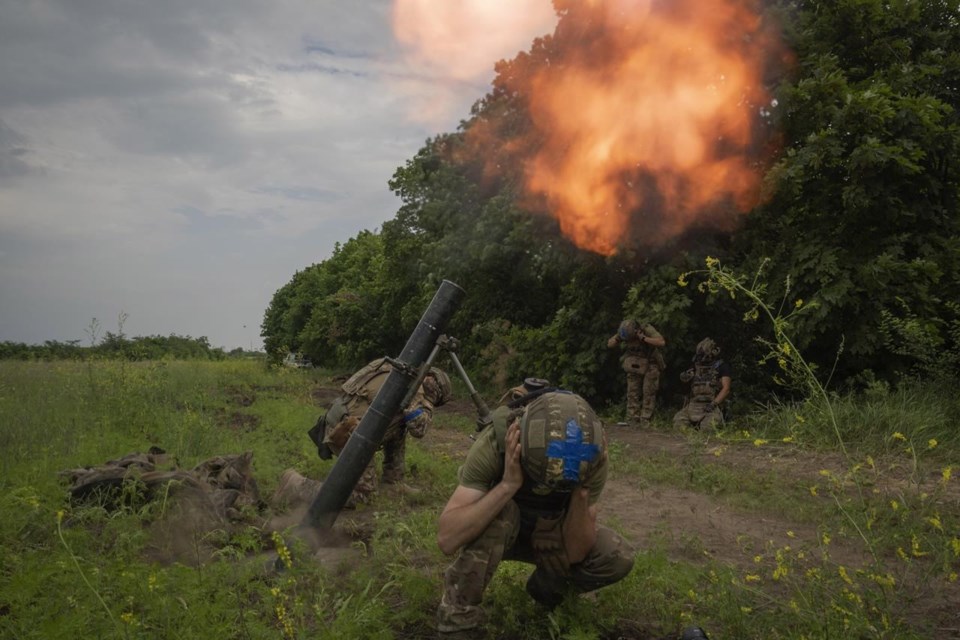TORONTO — As the world prepares to mark the anniversary of the Russian invasion of Ukraine, Canadian support for sending the embattled nation more ammunition and military supplies has grown since last fall, a new Leger poll suggests.
Saturday will herald two full years since Russia launched a full-scale invasion and plunged the country into a grinding, brutal war.
The federal Liberal government has vowed to stand with Ukraine for as long as it takes. But as the conflict has dragged on, it has grown into a domestic political flashpoint in both Canada and the United States.
"The Canadians I speak to from coast to coast to coast are still unequivocal that we need to be there for Ukraine," Prime Minister Justin Trudeau told a news conference Thursday in Nova Scotia.
"We are working with partners around the world to make sure we're sending more military equipment, whatever we can, and continue to purchase more on the world markets to send to Ukraine."
One in four respondents to the online survey conducted last weekend for The Canadian Press said Canada should be sending Ukraine even more military supplies. Just 20 per cent said the same in a comparable survey in October.
Still, Canadians appear divided on just how much is too much.
The latest survey found 23 per cent of respondents said they believe Canada should send fewer munitions to Ukraine, while 34 per cent said they want to see material support levels remain the same.
As for money, 38 per cent said Canada should maintain the same level of spending, while 31 per cent said the government should spend less. Only 16 per cent said they want spending levels increased.
To date, Canada has committed more than $9 billion in overall aid to Ukraine, Trudeau said.
A significant majority of people polled, about 60 per cent, said they see no prospects for peace any time soon and fear the war could drag on for several years. Another 33 per cent predicted two more years of conflict.
The survey polled some 1,529 Canadian adults Feb. 16-18. Online surveys cannot be assigned a margin of error because they do not randomly sample the population.
Earlier this week, Defence Minister Bill Blair said Canada would send more than 800 drones to Ukraine beginning this spring, a $95-million portion of the government's existing $500-million military aid package.
All the while, the conflict has become a popular domestic talking point for both the Liberal government and their Opposition Conservative rivals.
The Conservatives accuse the government of failing Ukraine and want Trudeau to deliver more lethal supplies. Canada has promised billions in military support, but not all of it has actually materialized.
For their part, the Liberals accuse the Opposition of "abandoning" Ukraine by voting against a modernized Canada-Ukraine free trade agreement — a deal the Tories opposed because it included a carbon price.
Canada had been united in its commitment to Ukraine until the Conservatives decided to vote against the agreement, Trudeau complained Thursday.
When it comes to humanitarian support, respondents to the Leger poll were less polarized. Some 41 per cent said Canada should maintain its current levels of aid, while 28 per cent supported an increase.
Only 15 per cent of people said Canada should send less humanitarian aid.
Since the invasion in 2022, Leger's surveys suggest fewer Canadians feel the conflict has the potential to develop into a world war, though 58 per cent of respondents still fear that possibility.
Three-quarters of respondents feared a global conflict could be in the offing in March 2022, an earlier Leger poll showed.
As for which country will win the war, 47 per cent of respondents in the latest survey said they didn't know. The rest were divided, with 28 per cent expecting Ukraine to defeat the invading force and 25 per cent saying Russia.
This report by The Canadian Press was first published Feb. 22, 2024.
Laura Osman, The Canadian Press



